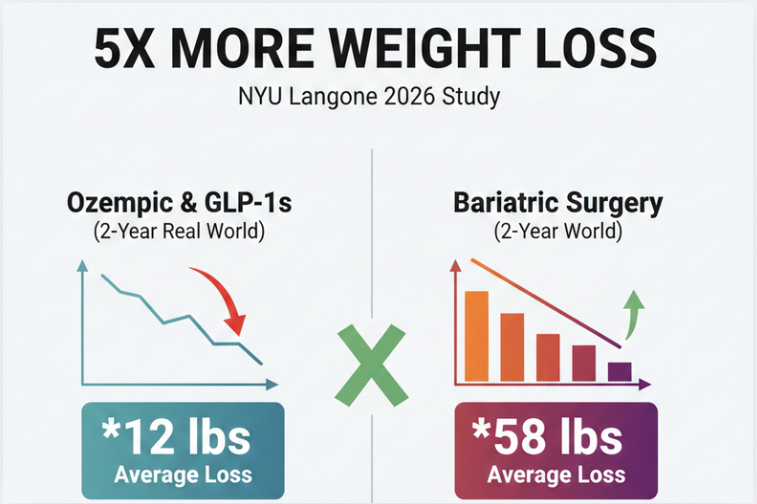Why Do People Regain Weight After Weight Loss Surgery?

Weight loss surgery, also known as bariatric surgery, has helped thousands achieve healthier lives, especially when traditional methods like dieting and exercise fall short. However, many people are surprised to learn that some weight regain is not uncommon after a few years. This doesn’t mean surgery has failed—it just means that long-term success depends on lifestyle, support, and understanding the changes the body goes through.
In this blog, we’ll explore the real reasons why some people regain weight after surgery—and more importantly, how to prevent it. If you’re considering or recovering from weight loss surgery, this guide will help you set realistic expectations and stay on track.
1. Understanding How Weight Loss Surgery Works
Before exploring the reasons behind post-surgical weight regain, it’s essential to understand how bariatric surgery actually facilitates weight loss. There are several types of surgeries, including:
- Roux-en-Y Gastric Bypass (RYGB): Reduces stomach size and bypasses part of the small intestine.
- Sleeve Gastrectomy (VSG): Removes a large portion of the stomach, creating a “sleeve” shape.
- Mini-Gastric Bypass (MGB): Similar to RYGB but with a simplified design.
- Adjustable Gastric Banding (Lap-Band): Uses a band to restrict stomach size.
These surgeries reduce the stomach’s capacity, lower calorie absorption, and affect gut hormones like ghrelin, which suppress hunger. Patients typically experience significant weight loss within the first year, often accompanied by better control over comorbidities like high blood pressure and sleep apnea.
But surgery is only the beginning of a lifelong journey.
2. How Common Is Weight Regain After Bariatric Surgery?
It’s important to normalize the conversation around weight regain—it’s not uncommon. Studies indicate:
- 30–50% of patients regain some or most of the lost weight within 2–5 years after surgery.
- 10–20% of patients may regain nearly all the weight they initially lost.
It’s not always a full reversal, but the partial gain is enough to bring back obesity-related health concerns, impact mental well-being, and undo years of progress if not addressed.
3. Top Reasons Why People Regain Weight Post-Surgery

-Stretching of the Stomach Pouch
After procedures like sleeve gastrectomy or gastric bypass, your stomach is significantly smaller. However, the stomach is a flexible organ and can stretch over time, especially with frequent overeating. As it expands, it accommodates more food, leading to increased calorie intake and gradual weight gain.
-Poor Dietary Habits Return
Initially, patients follow strict dietary guidelines. But over time, some return to:
- Snacking frequently
- Consuming high-calorie, low-nutrient foods
- Drinking sugary beverages or alcohol
Even small amounts of calorie-dense foods can cause weight regain when consumed consistently. These “liquid calories” and processed foods bypass the body’s satiety signals and can sabotage progress.
-Lack of Physical Activity
Exercise plays a crucial role in weight maintenance post-surgery. Patients who stop exercising or never build a regular routine are more likely to regain weight. Physical activity boosts metabolism, maintains muscle mass, and supports mental health.
-Emotional or Stress Eating
Emotional triggers—such as stress, anxiety, depression, or trauma—can lead to compulsive eating. Post-surgical patients who previously used food as a coping mechanism may fall back into old habits if emotional support or therapy is not part of their long-term care plan.
-Hormonal Adaptation
Over time, the body fights back against weight loss. It readjusts hunger hormones, slows metabolism, and increases cravings—this is called metabolic adaptation. Even after surgery, patients might notice:
- Return of hunger
- Strong cravings for high-calorie foods
- Plateauing weight loss despite good habits
This biological push toward weight gain makes long-term maintenance more difficult.
-Not Following Up with the Medical Team
Post-surgery follow-ups are crucial for:
- Monitoring nutrient deficiencies
- Addressing emotional or lifestyle changes
- Adjusting diet plans or medications
Patients who skip these appointments often lack accountability and early intervention, increasing their risk of setbacks.
4. Mental Health: A Hidden Key
Many patients undergo bariatric surgery without fully addressing the psychological aspects of obesity. Emotional eating, body image issues, or unresolved trauma can resurface post-surgery.
If therapy and behavioral counseling aren’t part of the recovery plan, patients are left with a new body but old mindsets. That disconnection can lead to self-sabotage, low self-esteem, and regaining weight.
A note on support groups:
Joining a bariatric support group, online or offline, helps create a sense of community and accountability. Patients learn from others’ experiences and gain motivation to continue making healthier choices.
5. The Role of Nutritional Deficiencies
Surgeries that involve intestinal bypass (like RYGB or MGB) can cause nutrient malabsorption, leading to:
- Fatigue
- Muscle weakness
- Low energy levels
- Cravings (especially for carbs and sugar)
When patients feel physically weak or unwell, they often eat for quick energy—usually choosing calorie-dense, nutrient-poor foods.
This sets up a cycle of fatigue and poor choices, contributing to weight regain.
6. Strategies to Prevent or Reverse Weight Gain
-Mindful Eating Habits
- Chew slowly, eat without distractions
- Stop when you’re 80% full
- Don’t skip meals
-Regular Exercise
- Combine cardio and strength training
- Aim for 150–300 minutes/week
- Stay active daily, even with small steps like walking
-Behavioral Therapy
- Cognitive Behavioral Therapy (CBT)
- Food journaling
- Identifying and replacing emotional triggers
-Meal Planning
- Prioritize protein-rich meals
- Avoid processed and sugary snacks
- Track macros and calories, if needed
-Regular Follow-Up Care
- Attend medical and nutritional check-ins
- Join bariatric support groups
- Consider working with a dietitian long-term
7. When Revision Surgery Becomes Necessary
In some cases, when medical management and lifestyle changes fail, patients may require revision surgery. Common scenarios include:
- Stretching of the gastric pouch
- Incomplete weight loss
- Recurrence of comorbid conditions
Revision isn’t a failure—it’s an additional tool, especially if complications arise from the original procedure.
8. A Lifelong Commitment
Bariatric surgery is not a quick fix. It is a lifelong commitment that demands physical, mental, and emotional effort. Patients must continually invest in healthy eating, physical activity, emotional regulation, and medical follow-up.
The real success lies not just in the kilos lost, but in the habits that replace the old ones—habits that last a lifetime.
Conclusion: Regain Doesn’t Mean Failure
If you’ve regained weight after bariatric surgery, know this: you are not alone, and you have not failed. Regain is a common and complex issue, influenced by biology, behavior, and environment. What matters most is what you do next.
Whether it’s recommitting to healthy habits, seeking therapy, reconnecting with your care team, or considering a revision, it’s never too late to take charge again. Weight loss surgery is a chapter—not the entire story. And your story isn’t over.










